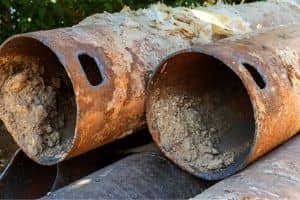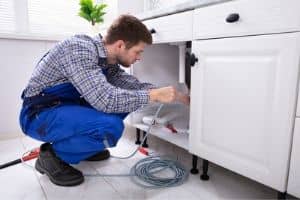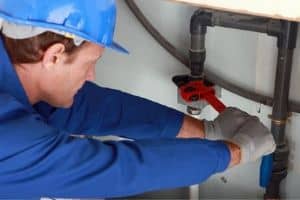
Most homeowners understand that the complex web of pipes in their home deliver the water we all depend on for our daily lives. Our home’s plumbing can be intimidating and we all understand that we need to periodically look for leaks to ensure that it’s functioning properly.
But, what else can you check? This article is going to teach you about pipe corrosion, how does it happen, and what you can do to stop this issue.
We’ll also briefly give you some suggestions on what you can do and who to contact if you suspect that your home has corroded pipes.
The Key Causes of Pipe Corrosion
The saying that you cannot judge a book by its cover certainly applies to your home’s pipes. They may look brand new on the outside, but the corrosion that is most damaging could be lurking inside, hidden from view.
There are three main ways that pipe corrosion occurs, once you know these you can work on a solution to stop corroded pipes from disrupting your life.
 Connections between different pipe materials: This is common in many older homes. The plumbing systems in these homes may consist of a mixture of galvanized steel pipe and copper pipe. Where these two dissimilar metals meet, corrosion can occur. There are special fittings that can prevent this from happening, but they weren’t common several years ago.
Connections between different pipe materials: This is common in many older homes. The plumbing systems in these homes may consist of a mixture of galvanized steel pipe and copper pipe. Where these two dissimilar metals meet, corrosion can occur. There are special fittings that can prevent this from happening, but they weren’t common several years ago.- Reactions between oxygen and metal pipes: Once any protective coatings are worn away, oxygen which is naturally in the water can form rust and oxidation on the interior of the pipe’s walls. This rust can build up, slowing the flow of water and cause your water to be discolored and stain clothes and fixtures alike.
- Minerals that naturally occur in your water supply: We rely on our cities and towns to provide us with clean water that is safe to drink. Most municipal water departments are reliable and treat raw water effectively. However, they do not remove dissolved minerals such as calcium in your water. This “hard” water can build up layer after layer inside your pipes.
While there are other reasons you could have corroded pipes. These are the three that homeowners deal with the most. Now that you know the causes of corrosion, let’s get into practical things you can do to stop your pipes from corroding.
Keeping Your Clean Pipes from Corroding
 By far the best thing you can do to maintain your plumbing is to ensure that the water flowing through it is the best it can be. We’ll assume that your water is safe to drink for this article and turn to what you can do to prevent corrosion because of high mineral content.
By far the best thing you can do to maintain your plumbing is to ensure that the water flowing through it is the best it can be. We’ll assume that your water is safe to drink for this article and turn to what you can do to prevent corrosion because of high mineral content.
The first thing you should do is test your water. There are kits available at your neighborhood hardware store that can quickly tell you if you have a problem. Once you know the quantity and types of minerals you are dealing with, you can treat the water to remove them before they work their way through your pipes.
The most common way to deal with dissolved minerals is to use a water softener. This appliance use salts and plastic resin beads to pull these minerals from your water. As a result, your soaps and shampoos will perform better and your pipes will remain clear and open.
One other thing you’ll want to check is the types of plumbing in your system. Do you have rigid copper piping or plastic PVC? Unless your home was recently built, chances are you have one of these two. Pay particular attention to where different types of materials interact.
Do you notice a specialized fitting? If not, this is something that you can address with a plumber who can recommend a remedy to this situation. These tips are great, but what if you already know that you’re dealing with significant corrosion in your pipes?
In this case, these measures cannot reverse corrosion that’s already established itself, however, there are a few options to get your water flowing clean, clear, and unrestricted again.
Is Repiping My Home the Best Answer?
 We hate to answer this question with a vague answer, but the truth is, it all depends. If your problem is in a small localized spot, it may be easy for a plumber to replace a small section to take care of the problem.
We hate to answer this question with a vague answer, but the truth is, it all depends. If your problem is in a small localized spot, it may be easy for a plumber to replace a small section to take care of the problem.
However, if the home is older and the problem is pervasive, the best answer may be to repipe your whole system. There is a newer flexible type of water supply pipe available.
Known as PEX tubing, this material is more flexible and plumbers can install it with a minimum amount of connections. Lastly, there are some mechanical and chemical ways plumbers use to clear up this corrosion.
If you aren’t sure where your plumbing system stands, we can help you decipher what your pipes may be trying to tell you. Don’t hesitate to give our experts at Towers Plumbing a call and we can develop a course of action that fits your specific situation.
